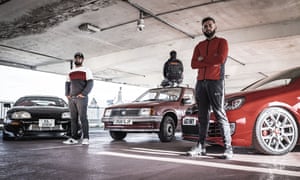Peaceophobia: Muslim men who love their modified motors
Mistaken for drug dealers? Monitored by police? A new play staged in a Bradford car park weaves stories of everyday racism, faith and petrolheads

“I don’t go out, I don’t really go clubbing, I don’t drink, I don’t do none of that,” says Sohail Hussain, who is explaining how all encompassing his hobby is. “All my money goes on cars – for me it’s an investment.”
Hussain is one of three actors starring in Peaceophobia, a piece from collaborative theatre company Common Wealth and Fuel that interweaves stories about Islam, faith and modified car culture. Set in a car park in Bradford, the three drivers – Casper Ahmed, Mohammad Ali Yunis and Hussain – chat pistons and prayer over the constant hum of engine noise and tension.
Ali is mistaken for a drug dealer because of his car, Casper is harassed when working as a doorman, Sohail is told “he’s not like the other Asians” when he politely interacts with dog walkers.
The play originated from Speakers’ Corner, a political safe space in Bradford where a group of young Muslim women suggested doing something to de-stigmatise their brothers’ love of cars and Islam. The group originally held a car rally in Bradford’s city centre, where motor enthusiasts of all backgrounds met and talked about their shared pride. After that was a success, Common Wealth decided there was more to explore in the subculture.
Written by Zia Ahmed, the production is a typical of Common Wealth’s collaborative approach. The actors, all of whom have day jobs, contributed real-life stories that made it into the play, while six women from Speakers’ Corner also served as co-directors alongside Evie Manning.
Iram Rehman is one of them and says the project is about informing and unpicking some well-worn stereotypes about Bradford’s Asian population, who make up 20% of the city’s residents. “Because of the Bradford riots, there’s a lot of stigma around Muslim men,” she says. “The impression is that they are violent because of what happened, and they don’t really have a voice themselves. These are normal, Muslim men. They are passionate about certain things in life but they just want to live their lives.”
Ahmed, who is from south London, spent time with the three lead actors, listening to their stories and crafting a play that delivers a deeper look into the daily experiences of the three protagonists, from everyday racism and religious bigotry to harassment and street violence. “Casper talks a lot about his faith in the play. Faith is what brings him peace, but it’s also the thing that puts him under surveillance.”
Manning says the dedication and skills they devote to their cars is somehow lost in the mix of moral panic headlines and a general distrust of Asian men that has festered since 2001. “It’s creative, it really is like art to them,” says Manning. “And when they see someone else’s car they appreciate it as art because they know how much work goes into it.”
Ali, who founded Bradford Modified Club which holds meets for car enthusiasts, explains that since the Covid-19 lockdowns, driving while brown in Bradford has become increasingly difficult. He estimates he’s been stopped more than 10 times in the last two months and faced fines that amount to hundreds of pounds. “It’s taking the piss,” he says.
That anger and tension builds through the play as the cars themselves begin to “speak” with the actors and map out the political moments that shaped the men’s experiences: from the formation of the BNP in the early 80s, to the Manningham riots in 1995 and the start of the Prevent strategy after 9/11.
The result is a rare – and often funny – peek into the psyches of British Muslim men and a shocking reminder of what two decades of Islamophobic media coverage and government policy has delivered.
Common Wealth are based in both Bradford and Cardiff and have built a reputation for their challenging, site-specific work. Peaceophobia is similarly rooted in its locality. Bradford’s Telegraph and Argus newspaper is peppered with stories about car crime and associated antisocial behaviour, while the lyrics and videos of local bassline acts like Bad Boy Chiller Crew constantly reference car culture..
“This play could only come from Bradford,” says Manning, who will be touring it around the country from September.
Yet despite the hyperlocal nature of the piece, Manning says Peaceophobia is about the universal problem of being misunderstood. These men are essentially geeks, she says. Nerds with an addiction to buffing their cars, rather than antisocial petrolheads. “There’s none of that easy stereotype thing of, like, boys who drive cars are tough. It’s just not that at all.”
Changing that perception is one of the reasons Sohail joined the project. “I just want people to understand us,” he says. “A lot of people who see a car come past think either he’s a drug dealer or up to no good. So if people have the confidence to approach us and talk to us after seeing the play – that would be a win in my eyes.”
Peaceophobia plays at Oastler Market car park, Bradford, from 10–18 September, then tours to Contact Manchester from 29 September to 2 October.



